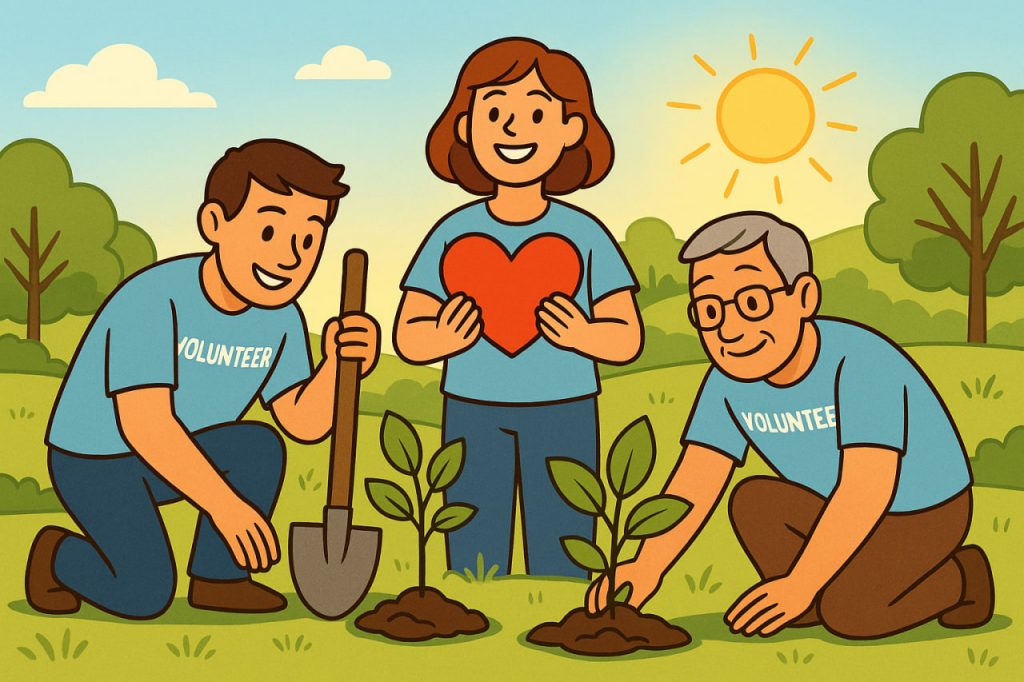Volunteering, while often seen as an act of kindness toward others, also provides powerful physiological benefits — particularly for the heart and circulatory system. Modern scientific studies confirm that people who regularly engage in volunteer activities have lower blood pressure, stronger hearts, and a reduced risk of cardiovascular disease. The explanation lies not only in physical activity but also in emotional well-being, social connection, and reduced stress — all essential factors for a healthy heart.
Emotional Health and Heart Connection
When people help others, their bodies undergo measurable biological changes. Acts of kindness stimulate the release of oxytocin — a hormone known to lower blood pressure and relax blood vessels. At the same time, volunteering reduces the production of cortisol, the main stress hormone that contributes to hypertension and inflammation. This combination makes volunteering a natural, non-medical way to protect heart health and enhance emotional stability.
Reduced Stress and Lower Blood Pressure
Stress is one of the most dangerous enemies of the cardiovascular system. Chronic tension causes blood vessels to constrict and the heart to work harder, leading to increased risk of heart attacks and strokes. Volunteering, however, provides a sense of purpose and emotional relief, shifting focus from personal worries to meaningful action. Studies have shown that individuals who volunteer for at least 100 hours a year are up to 40% less likely to develop high blood pressure.
The Role of Physical Activity
Many types of volunteer work involve movement — from cleaning public spaces to distributing food or helping with environmental projects. These activities promote healthy circulation, strengthen the heart muscle, and improve oxygen exchange in the body. Even light physical effort, performed regularly, lowers the risk of atherosclerosis and supports healthy cholesterol levels. Combined with the emotional satisfaction of helping others, this creates an ideal balance for cardiovascular health.
Social Bonds and Longevity
Social connection is one of the strongest predictors of heart health. Volunteering strengthens relationships and reduces loneliness — a factor proven to be as harmful as smoking or obesity for the cardiovascular system. When people feel connected, their nervous and immune systems function more efficiently, stabilizing heart rate and blood pressure. In this sense, every act of volunteering not only benefits others but also extends the volunteer’s own life expectancy.
Science Behind the Heart of Giving
Research by institutions such as Harvard Medical School and the University of Michigan has found that volunteers experience measurable improvements in vascular function and inflammatory markers. The sense of gratitude and empathy that arises during volunteer work triggers brain activity linked to relaxation and cardiac stability. Simply put, doing good literally makes the heart stronger — both symbolically and biologically.
Volunteering as Preventive Medicine
Doctors increasingly recognize volunteering as a form of preventive healthcare. By promoting physical activity, emotional satisfaction, and social interaction, it addresses three major risk factors for cardiovascular disease. Unlike medication, volunteering has no negative side effects — only the positive outcomes of compassion and connection.
Interesting Facts
- People who volunteer regularly have lower resting heart rates and better vascular elasticity.
- Positive emotions, such as compassion, directly influence the autonomic nervous system, which regulates heart rhythm.
- Communities with active volunteer programs show lower overall rates of cardiovascular disease.
- Oxytocin, often called the “love hormone,” plays a direct role in relaxing arteries and improving blood flow.
Glossary
- Oxytocin — a hormone that promotes relaxation, emotional bonding, and lower blood pressure.
- Cortisol — a hormone released during stress; chronic high levels increase heart disease risk.
- Atherosclerosis — the buildup of fats and cholesterol in artery walls.
- Autonomic nervous system — the part of the nervous system that controls heart rate and blood pressure.
- Cardiovascular system — the system of the heart and blood vessels that circulates blood throughout the body.


